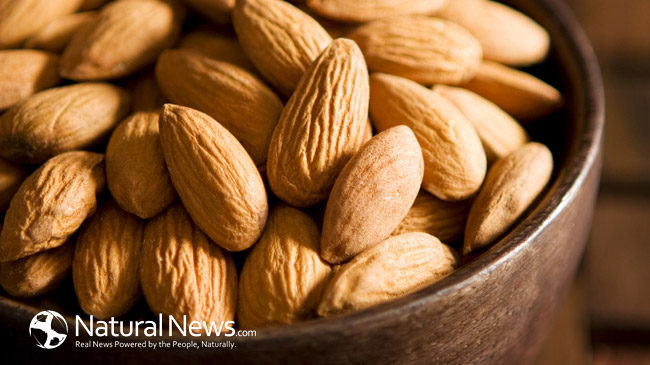Just a few almonds a day can make all the difference to your health. They are readily available all year round, but at their best during the summer. Technically, they are the seed of the fruit of the almond tree, rather like a cherry stone or peach stone.
HEALTH BENEFITS
- Almonds, like olive oil, are high in monounsaturated fats and are known to help lower cholesterol levels in the body and so help prevent heart disease.
- Their high vitamin E content, with its antioxidant qualities, also helps prevent heart disease.
- They are high in dietary fiber, which aids a healthy digestive system. Like all foods that contain fiber it is essential to drink lots of water to prevent constipation or bloating.
- The almond contains minerals, such as magnesium and potassium, both of which are essential for a healthy heart and circulatory system. To obtain the maximum health benefits, keep the skin on the nut, as it contains flavonoids which interact with the vitamin E to produce health giving properties.
- This humble nut also helps protect against diabetes. It is a low GI food and will therefore lower the GI of any meal which contains it. This helps to prevent a sugar rush after a meal and so helps stave off the onset of type 2 diabetes.
- The manganese and copper content of the almond combines forces to fight off free radicals which can damage cells and so lead to cancer.
EATING TOO MANY
- Weight gain
Remember that almonds are high in fat and calories, but as long as they are incorporated properly into a diet, they will not cause weight gain. The International Journal of Obesity and Related Metabolic Orders published a study which showed that people who were on a diet high in monounsaturated fats such as almonds, but low in calories, lost more weight than people who were on a low calorie diet which was high in complex carbohydrates. The answer is to ensure that the almond content is between 20-35 percent of your 2000 calorie per day diet and no more.
- Vitamin E Overdose
One quarter of a cup of almonds provides 40.2% of our daily vitamin E requirement. The recommended dosage per day is 1000 mg, anything in excess of that may cause symptoms such as tiredness, headaches, and gastrointestinal problems. If your diet contains other foods which are high in vitamin E, such as grains, eggs or spinach, then reduce your almond intake accordingly.
- Medication Interactions
Beware of having too much manganese in your diet if you are taking certain medications such as antipsychotics, laxatives, antacids, and various antibiotics and blood pressure tablets. The recommended daily dose in between 1.8 and 2.3 mg per person per day.
People with gall bladder problems or kidney stones should not eat nuts at all.
HOW MANY ALMONDS PER DAY?
A study published in the British Journal of Nutrition found that people who ate one quarter of a cup of almonds (2 Oz) per day were significantly healthier at the end of a six month trial. The subjects were given medical examinations at the beginning of the trial and told to eat normally for 6 months, when they were given another medical examination. The subjects were then told to keep their diet exactly the same except for the addition of 2 Oz of raw almonds a day. After another 6 months, they had another medical examination and it was found that they were healthier in every respect. The Food and Drug Administration recommends a daily intake of 1 Oz per day.
More from Alex Jordon:





